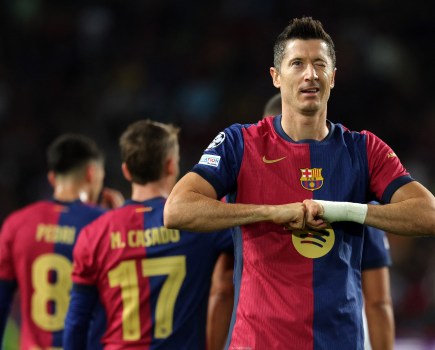 It is 3.45 on a Sunday afternoon in late November, and I am standing outside the bar Monopol in the relatively upmarket district of Barcelona known as Poble Nou (they even have their own Rambla, along one side of which this particular establishment is situated). However the bar is shut, and there does not seem to be any prospect of it any opening any time soon.
It is 3.45 on a Sunday afternoon in late November, and I am standing outside the bar Monopol in the relatively upmarket district of Barcelona known as Poble Nou (they even have their own Rambla, along one side of which this particular establishment is situated). However the bar is shut, and there does not seem to be any prospect of it any opening any time soon.
I have been directed here via e-mail by an Espanyol supporting friend of mine, who happens to be German, is married to an (English) language school owner and lives in Salamanca. He assures me that this is the place to go if I wish to learn more about being an Espanyol supporter in an age when at times the whole world seems to be in love with your bitter rivals, and more specifically what it means to be a member of a ‘peña’, the Spanish equivalent of a supporters club. As I stand alone in the cold and almost deserted street, I am beginning to wonder whether Dieter is having a good laugh into his Sunday lunch about 500 miles due west of my current location.
However my fears of being stood up prove unfounded, as moments later the bar’s owner arrives, and the Monopol soon begins to fill up with supporters. The man responsible for this throng is amongst the first to arrive. Josep Ventimilla is the president of the Pericos del Poble Nou supporters club, which he established eight years ago having spent the previous 28 years as one of the driving forces behind another similar organisation in the area.
Of course the concept of a supporters club is not one which needs explaining to any football follower, but I have always been intrigued by the scale on which they operate in Spain. At the last count, Espanyol has nearly 200 peñas within Barcelona’s city limits, and many more in the Catalonian region. What is their attraction (other than that they nearly all seem to have a bar as their headquarters), and what do they offer to their members?
“There are a number of practical benefits to being a member of this peña,” explains Ventimilla, in between accepting money from his fellow supporters for entries into the club’s monthly lottery draw.
“For €20 a year, we provide transport to and from the stadium (a round trip of over 20 miles from the bar), and whilst each supporter undertakes to become a season ticket holder (a ‘socio’) independently of us, as a registered member of our peña they are allowed by Espanyol to pay for it by direct debit, thus spreading the cost over the entire campaign.”
I am sceptical as to how this can work. “How come you all still sit together if you buy them separately? And how is it that I am able to come and sit with you all today, if everyone here is a season ticket holder?” I ask.
Ventimilla has an answer for that too.
“We all buy our season tickets in the same block of the ground, which is reserved for us by the club,” says. “The normal adult price is €300, although there are concessions for under 26s and over 65s. Then the ‘peña’ also buys six more season tickets that can be used by friends and family on an occasional basis.
“We ‘sell’ these season tickets for half the price that it would cost to get into that particular game, which when you bear in mind that the cheapest seat to watch the ‘big two’ this year will cost you a total €190, is a pretty good deal for everyone – people like you save 50% on the ticket office price, and we still have no difficulty in covering the cost of the six season tickets.”
Suitably impressed, I hand over my €20 for today’s game, gain temporary possession of my season ticket and follow the exiting masses in the direction of a nearby side street, where the bus is waiting with at least as many supporters as had been in the bar. In total the Peña Pericos del Poble Nou has 170 members, but for this relatively low profile encounter with Osasuna, there are only a busful making the trip today.
En route I ask Josep what got him started on this lifelong obsession with Espanyol. Were his parents the driving force?
“Not at all,” he replies. “I had always followed the team from a very young age, and then the time came when I wanted to start going to the stadium. I said to my Dad that if I did well in my end of year exams, I wanted a season ticket. I am not sure whether he ever thought he was going to need to keep his side of the deal, but I kept mine and then he just had to keep his!”
Of course back then the ‘pericos’ played in the Estadio El Sarria, built in 1924 using funds raised by the team embarking on a lucrative South American tour. However by 1997 the debts were piling up, and the stadium was beginning to look the worse for wear. A move seemed in everyone’s best interests, with the land being sold and the stadium being razed to make way for apartments in one of Barcelona’s more upmarket districts.
However fourteen years later Espanyol are again mired in debt to the tune of €148,000,000, eye-watering even in a country where enormous debts seem commonplace amongst La Liga football clubs. How did it come to this?
“I don’t like to be critical of the local government, but we were properly stitched up,” suggests Ventimilla. “The Sarria site was sold for way less than it was worth, and we were then left to rot in the Olympic Stadium because they did not want it to be a white elephant. Nobody liked it there, our support suffered and it took far longer than they had promised to get our own ground again because it suited them better for us to stay there. We are paying the price for that now.”
Nevertheless despite the huge financial millstone around their necks, and the even bigger shadow being cast by the team down the road in recent seasons, the club is thriving in its new home, the Estadi Cornellà-El Prat.
For the traditional football supporter, it is the very antithesis of cool, sitting as it does next to a motorway on a retail development park. However it certainly seems to tick the boxes for the both the old and new generations of ‘pericos’.
“I loved Sarrià, but there was very little shelter there, I lost count of the number of times I got soaked watching my team!” Josep recalls. “We never managed to top 25,000 season ticket holders there, here we have more than 35,000. Sure, there were many of us that were sad to see us move to a completely new area of Barcelona, but we have to look to the future and in 2011 people want proper facilities, they don’t want to get cold and wet watching their team. What we all want is for this club to move forward, and it is certainly doing so here.”
And what of those pesky neighbours and their thirteen trophies?
“Nobody chooses Espanyol over Barcelona because they believe that we will one day be bigger and more successful than them. They have everything on their side, a huge stadium, a massive amount of TV money, and they are still in more debt than us! We are the underdogs, always have been, always will be. Every now and again we will beat them, or win something, and we enjoy it far more than their fans ever could. That is good enough for me.”
On this particular Sunday afternoon, a below par performance results in a disappointing 2-1 defeat against the team from Pamplona. However with key players soon to return to the fray after injury, there remains a general mood of optimism amongst the ‘peña’s members that they will secure their Primera Liga place for the following campaign a lot earlier than last season, when it all came down to a very nervy last day.
Whatever the eventual outcome, Josep will use whatever funds have been raised through subscriptions and the monthly lottery to organise a supporters day out before everyone disappears off on their summer holidays. It could never work in England – could it?
By Liam Bainbridge
This article originally appeared in In Bed with Maradona






